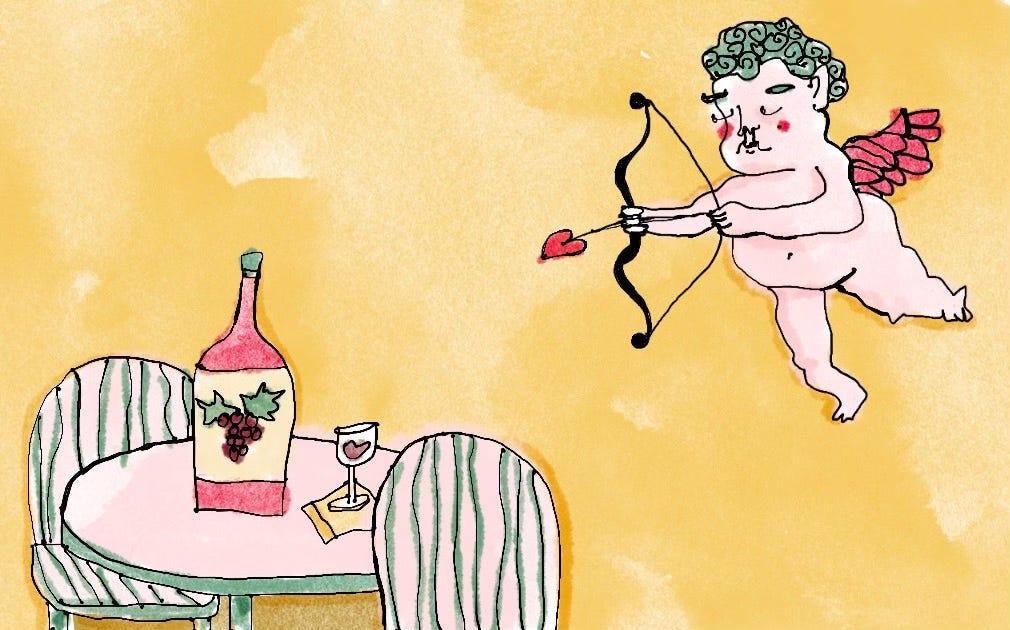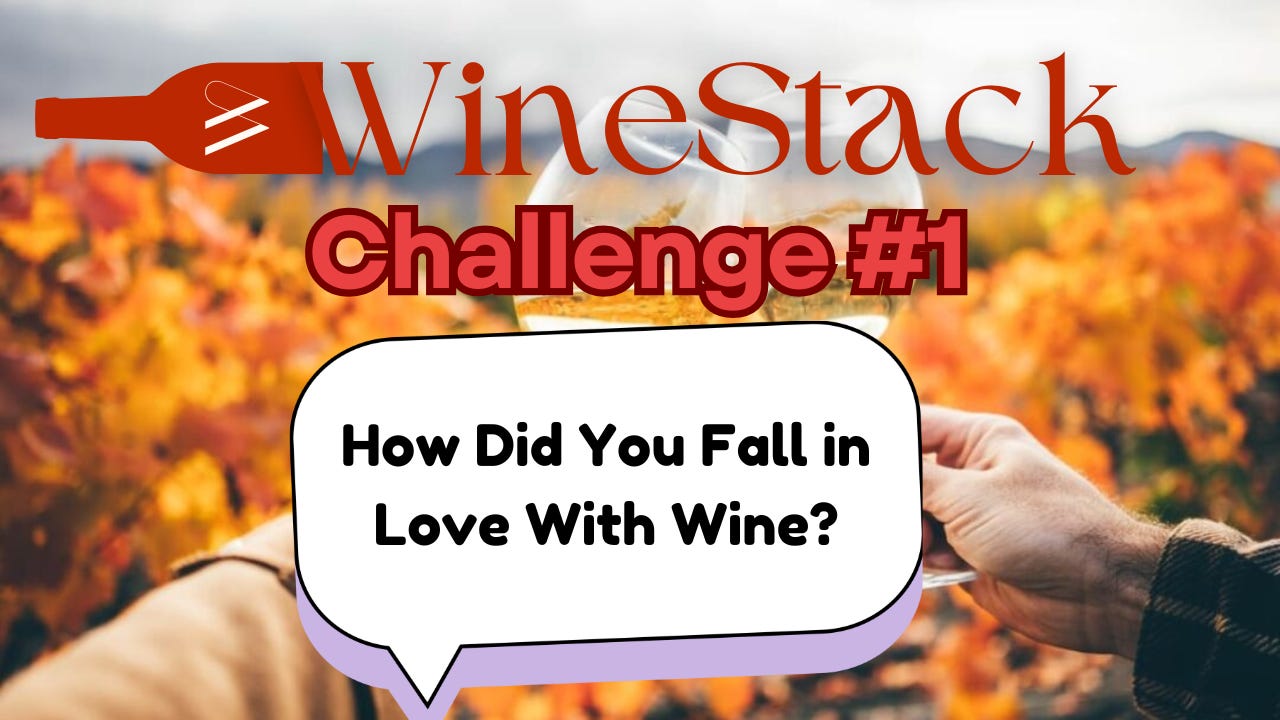Falling in Love
With wine, art, or other people. (Plus: WineStack Challenge #1)
Podcasting and independent writing ain’t easy, folks. If you love what we do here, become a subscriber! Just being part of our community means the world to us, and helps this Substack gain traction.
And if you can consider becoming a paid subscriber, that helps to keep the wine and entertainment flowing around these parts. And for only $2/month!
I recently went on a date, my first in well over a year and a half, and it was my first non-app derived date in...heyzoos christe, 24 years!!! (There were two long term relationships covering most of that, but I met the second person via a dating app, so it's been more than half my lifetime since I managed an organic date!)
I told a friend about this upcoming event, and he immediately shifted into advice gear: "Be yourself," he said. "But make sure to keep some of the mystery. Don't unload everything in one go."
This is, of course, a common piece of dating advice, but his use of the word "mystery" triggered my wine PTSD and my brain connected it to the term "demystify". And I realized: you can't demystify anything if you want someone to fall in love with it.
Because falling in love is falling in love. And no one ever fell in love with something (or someone) that didn't contain an element of mystery, something to intrigue.
How I Fell In Love

The prefix "de-" merely means "down from" or "to lessen", not necessarily eliminate. "Demystify" as well as "Simplify" commonly means "to make something easier to understand" and certainly we do need to lessen the mystery of anything (or anyone) in order for love to blossom. We'd never fall for a person we learn nothing about, have no entry point into. (Clean minds!) Without this learning, it's merely obsession.
I thought back to when I first began to drink wine. I had injured myself rather terribly and was going through a lengthy rehab. I had never been much of a drinker, but I noticed that when I went out for a social drink or two, my pain felt a LOT better (dangerous thought!) Being a lightweight and inexperienced with booze, I turned to wine for its lower alcoholic content + I already knew I didn't like beer.
Back in my early 20's, I was an actor on the east coast. Meaning I waited tables for a living. I worked at this fine-casual east coast seafood chain "Legal Seafood", located in an indoor mall (which were still a thing!) and this place had a 200+ bottle wine list. One week, over the course of 3 days, they had the wine director who created the list come in and walk us through tasing nearly every bottle. (He did not open the Opus One, however. Bastard.1)
I sipped and spat, sipped and spat, sipped and spat. I did not like any of it. I didn't understand any of it. I didn't have the palate for any of it aka the experience to determine wtf it was I was tasting or smelling no matter how assuredly the wine director told me what I was tasting or smelling.
Until this one wine: I tasted it and...I didn't hate it. I thought: "okay, I can see myself *learning* to like this, if I ever give it a real chance." It was a David Bruce Petite Sirah. And even though I didn’t love it, even though I didn’t entirely like it, 10+ years later when I finally decided to give wine "a real chance", I never forgot the name of that one bottle among 200.
To begin, I was exactly brave enough to enter the Trader Joe's wine section, and kept it simple: find a Petite Sirah, don't spend too much, god knows if I'd even appreciate it. One glass per night, just to take the edge off. It wasn't bad. I went back for more Petite Sirahs. They only had like 3 so I had to branch out after that - I hate drinking or eating the same thing too often. I just kept buying random bottles, always different ones, until the question was impossible to ignore: what exactly WAS all this shit? What were all these words? Most bottles I couldn't even tell if there was a grape listed or not. This was impossible.
But: it was also good. It also made me happy.
I was soon gifted a trip to Santa Barbara, my first wine country trip. I did not understand how terroir worked (I likely did not even know the word existed) so I was extremely disappointed to discover all the wine from a single area tasted roughly the same.2 Why were they all so light in color and body? So fresh in style? Why were 90% of the wines Pinot Noir and Chardonnay? Where was the variety? Why did they all have this ocean salinity on the backend?
I was annoyed that my Santa Barbara experience wasn't the same as selecting from the massive rage of wines inside a shop. But there was something about so many wineries, so many winemakers of different personalities and genders and philosophies, the drinkers, the employees, there was all this passion for something I could not get a handle on. This was mystery, and it drew me in.
Not that mystery alone is ever the key - that can only intrigue short term. As with human relationships, there has to be substance uncovered when you journey into that mystery, and that substance has to beget more substance. And **** me, did wine ever have all that substance and more.
Not that I knew this going in, it's a rabbit hole of knowledge that fits the "If I'd known how hard it would be, how endless the struggle, I don't think I would have done it" mold. And many of us, if not all of us, have had rewarding relationships with a person we would not have chosen on paper, if we'd simply known everything in advance, if not for the mystery, and then the substance. Eeked out a little bit at a time.
Lovers Are Translators
The excellent Kit Lazer recently wrote about why the study of a thing is so critical to communicating how it works to others; of course, expertise can also distance us from a non-expert POV, and not everyone is good at communicating or teaching, both skills in their own right.
Film Critic Charlotte Simmons summarized Kit’s post brillaintly with a quick Note about how Critics are Translators of the medium.
They aren't (or shouldn't be) arbiters of "good" or "bad", but rather a well-trained, critical mind to help break down what a work of cinema is doing, how its doing it, ways to think about it, recurring themes and motifs. The casual movie goer isn't meant to dedicate the same amount of time and study to the form that a lover of the medium does. That's what critics are for.
Likewise, Somms and wine writers are translators for the wine industry, taking something inordinately complex and never-ending in terms of knowledgebase, and helping put into shape what's important and able to be known in any given event or experience. In that sense, Critics for film and Somms/writers for wine, their job is to "DE-mystify" (but not UN-mystify) the subject. Yes, even to "simplify" in the sense that writing or saying anything at all, putting in the thought and pulling together the infinite threads to weave a specific pattern for the right here right now, is simplifying things from the amorphous mass of possibility it would otherwise be. It gives non-lovers an entry point. This is the role of the professional that engages with an audience.
Wine and Art are nearly infinite in their variety, in their possibilities. It's too easy to unload too much too quickly. Much like with dating, you can't just info dump / unload everything about wine or a film's substance in one go. People won't want a second date if you do. So professionals have to "simplify" and discover the best way to IV drip what's critical at a pace that intrigues but does not overwhelm. That sparks interrogation but not rejection.
Not everyone will become a lover of any given thing or person. That doesn't mean we don't learn by experiencing the love/ translation, shaping their relationships, the things they're dedicated to, demonstrating how its done. We've probably all been in a long term relationship when at one point a friend or associate told us "You two were/are an inspiration." The example is always critical in inspiring future lovers to love similarly. It will rarely happen in a vacuum, with no one doing the work.
I'm Romantic, But Not *A* Romantic
I've never been religious, or even spiritual. I do not believe in an afterlife or a soul or anything like it. I only believe in the physical "mundane" universe. However, I believe the physical universe is an endless stretch of knowledge and mind-blowing concepts we have only begun to scratch the surface of.
What's the difference, then, of things we don't know and a spiritual unknown? We will continue to learn more and more about reality. Possibly never everything, but always more. There is no hard limit to our ability to learn, to our eventual knowledge and experience. The moment we throw our hands up in the air and say "it's a mystery", we have failed ourselves.
The limits of our personal perceptions are never the limits of our knowledge or understanding. When you love a person, you will "know" them, you will even say "you know me better than I know myself!" But we will also never be inside that other person's head. We will never have any ACTUAL perceived experience with what it's like to be that other person. They will remain a "mystery", in a sense, and up to a point. But the day we stop learning about them, paying attention to them in order to learn more, to understand at a yet deeper level, when we say "they're a mystery" so kick back and relax, then we will have failed that relationship, that love.
Wine, Cinema, Art of any kind, and other human beings: they are their own objects, their own existence, outside of us. But if we want to love these things, and live in a way that professes that love, we can never allow them to be mysteries and little else. We can never allow for a line to be drawn where we say "there, that's the line, we can never learn further, we can never know more, this is where the mystery will forever remain."
I'm romantic in action and mindset in the sense that I believe in falling in love - intimate, familial, and platonic. I believe in commitment, and digging deep into that love, not to smother, not to overwhelm with my own ego, but to always understand further, and to care deeper. To know more, and declaring anything soulful, spiritual, or religious (at least literally so) is to declare we will henceforth know less.3
Wine, art, and people are very mundane things. They are very real. We make them, we shape them, we consume them for our own ends. They will never be known in full, but to love them is to learn them every day you can, within the limits of our human perceptions.
Your Turn: WineStack Challenge of the Month
We do not all love things (or people) for the same reasons. We are not drawn to them in precisely the same ways, which is something we often forget, stuck in our own heads.
As mentioned before, I'm a variety fiend - I fell in love with wine because of this variety, this never-ending range and vastness of expression. It's why I fell in love with literature and cinema as well. I appreciate "terroir" (as I similarly appreciate "auteurs") but largely love wine because it can express beyond terroir, that it has that potential within it, that it has such range and lengths and depths4. I largely reject the notion of "mystery" as a true unknowable, and instead love that we can learn so much and never stop learning, that our understanding of wine and how we make it does in fact evolve and arguably will continue to forever.
In the spirit of FilmStack's "Challenge of the Month", and as an experiment in place of a "Wine Conversation" for August, I wanted to simply put out this open call to any and all WineStack writers, whomever you are and whatever POV or position(s) you hold in the world of wine:
"How Did You Fall in Love With Wine, and How Do You (Hope to) Express That Love?"
I want to read your personal story, not just the professional journey in terms of credentials, but the personal center of why you're here, writing about what you write? And what makes your story YOU, how is your personal journey unique at least in your own view?
Let's all post our stories sometime during the month of August. And no matter how common or uncommon the story, remember that falling in love is falling in love. It's always the best part of being here, spinning on this granite that we like to call a planet.5
I kid - whatever quality would have lost on me in any event. Trust me, this was a very well curated wine list. I just didn't like wine. I know there's supposed to be an "a ha" moment for everyone, like you have that one glass of truly excellent wine and suddenly, from 0 to 60, you "get it". But all this excellent wine was lost on my palate. There was no "a ha" moment. Just the slow, plodding rewiring of my taste bud receptors over the course of years.
I didn't have a sophisticated or trained palate yet - the wines weren't all exactly the same, but that terroir-driven, foundational similarity kept the overall styles in line with each other, the flavor profiles from varying too greatly. And remember, I'm a variety fiend - I hated it!
I can already hear the spiritual folks sharpening their knives at this statement. Spiritual mindsets tend to believe that we can connect to, or get in tune with, things larger than us. But rarely that we can logically and fully *understand* them. And that's where my own pov differs: there is no endpoint to what we can understand, fully. We just continue learning, indefinitely.
Terroir, of course, is actually ANY authentic expression that isn't heavily manipulated to an inauthentic extent. I do enjoy "terroir" by that definition, and the variety fiend in me loves that the same wine from a different place will therefore be different. But I easily get bored by "terroir" as defined by a very specific flavor profile and winemaking style that is meant to adhere to a region, where it can be outlawed to experiment outside of certain extremely controlled lines. It's one thing to only call wine from Burgundy "Burgundy", it's another thing to demand a wine be called "Vin de France" because they tried something new even though the wine is in fact from Burgundy. That's like saying a Hollywood blockbuster wasn't "Hollywood" because it didn't use the "Save the Cat" structure. Wine (and storytelling) is vaster than this, even within specific categories. I don't want consistency. I want the vastness.
Yes, that's a Blues Traveler reference.






Love this idea - thanks Dave! And seeing as how I seem to have absolutely no qualms babbling on about myself in the very public forum of Substack, I feel I will have no problem living up to the challenge 😆